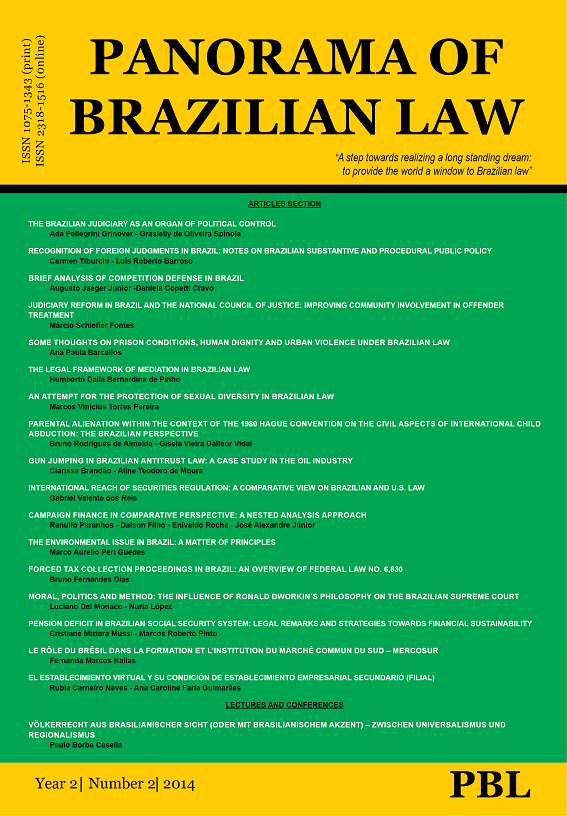THE BRAZILIAN JUDICIARY AS AN ORGAN OF POLITICAL CONTROL
DOI:
https://doi.org/10.17768/pbl.y2.n2.p15-32Resumen
The fruition of fundamental rights like healthcare, education, worthy housing and work is directly related to the creation and implantation of universal and egalitarian public policies by the Congress and the Public Administration. In the cases where the existing public policies are shown to be insufficient, inadequate or do not achieve the fundamental goals of the Federative Republic of Brazil, it arises the need of the action of the jurisdictional function to control the constitutionality over these public policies. In Brazil, this control is made both by direct way, by means of its own constitutional actions, and by diffuse way, by means of collective actions interposed in first instances courts. In this context, the enforcement of the liberal theories like Montesquieu’s Separation of Powers and the Intangibility of the Discretionary Activities reveal themselves incoherent with the Democratic Rule-of-the-Law State. In another way, the jurisdictional action is limited by the Reasonableness, by the Possible Reserve and by the Existential Minimum, and can also find some obstacles in the individual actions that end up influencing the public policies. Therefore, there is a great effort to colectivizing individual actions by Brazilian schoolars. Another problem is the difficulty of Judical Power in using the adequate procedural class action. It will be analyzed one specific decisions made by the Court of Justice of the State of São Paulo about the jurisdictional control of public policies related to the autistic people, with a goal to point out a direction to the improvement of the jurisdictional tutelage in terms of effectiveness and adequacy.Descargas
Publicado
2014-10-08
Cómo citar
Grinover, A. P., & Spínola, G. (2014). THE BRAZILIAN JUDICIARY AS AN ORGAN OF POLITICAL CONTROL. PANORAMA OF BRAZILIAN LAW, 2(2), 15–32. https://doi.org/10.17768/pbl.y2.n2.p15-32
Número
Sección
Articles
Licencia
Panorama of Brazilian Law employs Open Journal Access policies.
Authors are fully and exclusively responsible for their submissions.
Authors who publish with this journal agree to the following terms:
- Authors retain copyright and grant the journal right of first publication with the work simultaneously licensed under a Creative Commons Attribution-NonCommercial-ShareAlike 4.0 International License that allows others to share the work on a non-comercial basis with an acknowledgement of the work's authorship and initial publication in this journal and indicating if any changes were made. If you remix, transform, or build upon the material, you must distribute your contributions under the same license as the original.
- Authors are able to enter into separate, additional contractual arrangements for the non-exclusive distribution of the journal's published version of the work (e.g., post it to an institutional repository or publish it in a book), with an acknowledgement of its initial publication in this journal.

